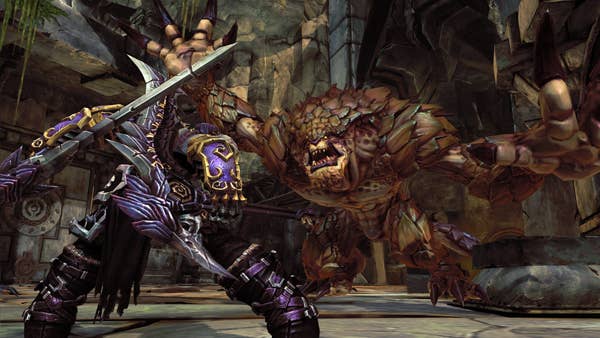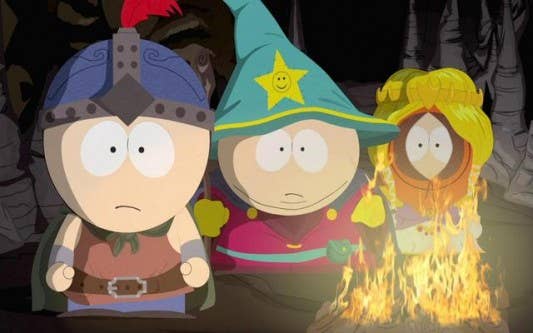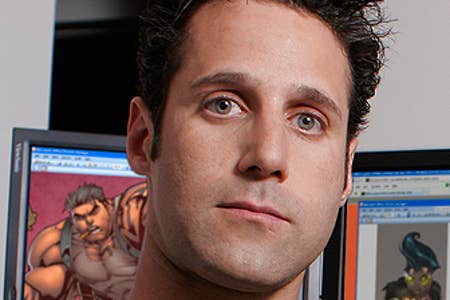THQ's Jason Rubin: "Everyone's out there beating us up"
We speak with the new THQ president to get his take on what needs to be done to get THQ back in the black
Jason Rubin, the co-founder of Naughty Dog and creator of the once hugely popular Crash Bandicoot, has a long history in the games industry. With Danny Bilson having recently left THQ and the publisher needing someone to drive its games strategy, the company looked to Rubin to overhaul its business and get it back to profitability. Whereas Bilson oversaw product development and marketing, Rubin, in the newly created role of president of THQ, is second only to CEO Brian Farrell and will have a larger impact on the publisher's future.
Rubin will be directly responsible for deciding which projects actually see the light of day and are worthy of THQ's investment, and he told GamesIndustry International all about it during E3.
I think the way of looking at it is Danny had the ability to change a certain portion of the company, certainly PD, possibly marketing, but I believe the issues were bigger than that and I have the capability of changing more of the company because I'm in a higher role, so more of the company reports to me. The only person I report to is Brian. And that's important.
Brian called me up and said, "Look, will you do me a favor and go around and take a look at everything we've got and come back and tell me what you think?" So I did a three-week tour around all of the teams except Metro, which is a third party company in the Ukraine - that was a little too far. But I did play Metro. I said, "You know what, Brian? You've got a reasonably sized slate. Maybe it's one title too big. A lot of them are good games, but most importantly, the teams are excellent and some of the stuff that hasn't been announced that people haven't seen is really good. I think you have a huge opportunity to make this better." And he said, "Well, where do you think the industry's going? Do you think these titles can compete with $120 million dollar super titles?"
"We're not going to be doing side projects in mobile or casual. You're not going to see that stuff"
Jason Rubin
So I said, "Well, you know, three, four years ago I would've said no. Even two years ago I would've said no." But looking at the industry in the future and what's happened in PC space, I think there's going to be a much wider variety of games in the future. I think you'll see things like Portal or World of Tanks or League of Legends or other ways of attracting people that don't require the snazziest graphics, the most dollars per minute on screen, 600 person teams. Not that those titles won't do well. They'll do really well. And they'll get bigger and that's a race. But we don't have to necessarily play in that race. Maybe some of our titles will compete with some of the mid-sized triple-A titles - you know, a Naughty Dog title or something in the $50-$70 million dollar range. Some of our titles might be smaller than that. Whereas two years ago that might've been death, in two years I don't think that'll be a problem.
And I think we can do all right without it. Take a look at [South Park] Stick of Truth. A lot of people are talking about it, excited about it. That's not a blockbuster. Graphically, it's not going to compete with Call of Duty, but it's a really cool game. Metro's gotten a lot of nominations for Best in Show. Company of Heroes, the sequel to the highest rated RTS of all time. There are good things to do. [Saints Row developer] Volition, has an incredible amount of talent. I think that if they had been fostered in the same way that Naughty Dog was at Sony, given the tools that they needed to succeed, that there would be a much much more successful title there.
Not that Saints Row hasn't been successful, because it's a successful title. But they could have a blockbuster. So perhaps that team is making triple-A and some of the other teams are making a little bit smaller, and that's OK in the future, because there will be other ways in the future where you don't have to put it in a box at 60 bucks next to another $60 title that had five times the budget and four times the marketing. I think it's a great challenge. I think there's a huge potential. So that's why I came here.

Yeah, I'm not sure it's Xbox Live/PSN. I think that that's all going to morph. People tend to look at the industry as it is today and besides looking at hardware changes, which they know are coming, they never assume that there will be business model changes. And that may be fair because the business model hasn't changed in a long time in consoles. But I think if you look at what's happened and what's working outside of it - mobile, casual, PC - it's going to happen. And when it happens, I think it's good for the gamer because the gamer gets entertainment of a much broader variety, and I think it'll be good for THQ.
I don't think you have to see it in every title. Saints Row - if we do more Saints Rows, Saints Row may not be a place for micro-transactions. And again, that's fine. I'm not suggesting that every game out there has to do that. If somebody wants to make a game without micro-transactions, great. If somebody else wants to make a game entirely paid for by micro-transactions, I don't think there's any reason to complain, because you get to try it for free. So yeah, I think that's exactly what we're talking about. That variety of stuff.
"People are so used to the downward slope that they don't see that it can flatten out. So I'm here to make it flatten out and then turn the corner"
Jason Rubin
I've been seven days on the business. I've seen all the projects. Tonight, literally, I get picked up and I go to the airport so I can start visiting the teams and start talking about what they're going to do next. Some of the teams, like the Darksiders team, Vigil, clearly needs a project to do soon because they're about to finish Darksiders II. Other teams, including Volition, have a much longer time before they need it. The HomeFront team, which is Crytek, they're in the middle of the game, so I won't be changing anything there for quite a long time, if ever. So it's a big ship, it takes a while to steer, but yeah, some of the teams will immediately start on their next stuff.
Right. I think when you look at the business and you model it out, it's not how many failures you have, it's how many successes you have. So the problem is when you don't create hits or you don't create titles that do really well. The reason that THQ is here is because Saints Row is really successful. You have to create titles that sell copies and do well and that's what we're going to focus on. I'm not going to worry as much about the ones that don't do well.
You can only lose everything, but you can make an infinite amount of money. So there's a significant amount more upside than there is downside. You can't fail at everything all the time or you're done. One of the things I plan on doing is making a much more concise portfolio. I will not expand into the money I have because I want to keep this money around for a rainy day. So THQ is going to be a lot more careful with what it does and a little less cavalier. You won't be seeing another uDraw. We're not going to be doing side projects in mobile or casual. You're not going to see that stuff.
Correct. There will come a day where the tablets are extremely powerful and capable of running games. I think Company of Heroes, as an RTS with its control mechanism, is much easier to move onto a tablet than something that requires a dual stick and a significant amount of controls. It's just inherent. So could a Company of Heroes or something along those lines end up on a tablet soon? Absolutely. Do I think that there is going to be a Saints Row on a tablet? In the immediate future, no I don't. Eventually? Sure, if we can figure out the control issues that are obviously inherent in core gaming. Tilt and touch doesn't really work that well. There are a lot of opportunities.
Well, I don't think that at the end of the day Guillermo Del Toro is making the game that much more or less expensive. So the question is really, "Are these people who you hire from outside creating good content?" And sometimes you'll do it. Sometimes you won't do it. I think it really depends.
I believe that the teams that we have are capable of making their own content; specifically Vigil is an incredible talent. I think we have to look at the products they're doing and see if we can make something that perhaps hits the market more directly, although Darksiders II is a fantastic game. But all of these teams I think have the ability to make their own stuff. Obviously, there's no replacing [South Park creators] Matt [Stone] and Trey [Parker]. They are who they are. And that's a perfect example of a case where they're worth every penny.

How many titles got people walking up on stage at the Xbox conference? Well THQ did. Everyone's out there beating us up, but there we were, along with the big games. And everyone's saying, "Oh, look, Stick of Truth." They're looking forward to it, that could be huge... but "THQ isn't going to make it." There seems to be this disconnect. Metro gets best game shown nominations, but "THQ may not make it." Company of Heroes - nominations, but "THQ isn't going to make it." People are so used to the downward slope that they don't see that it can flatten out. So I'm here to make it flatten out and then turn the corner.
"I made a speech many years ago that I thought developers should get a significant amount of credit and you will see that happen in this company"
Jason Rubin
I just came to the company seven days ago, so I don't have a decision on every single one of the titles. I will say that the number of teams and the number of people we have on the teams will probably grow - or, at least the number of people we have on the teams. As to each project and what every company is doing, they're still a work in progress. Clearly, Darksiders is coming out. Clearly, Company of Heroes is coming out, etc, etc. But there's a lot in flux with our future titles.
The teams that are here are survivors because it's been very difficult. So for Volition and Vigil and Relic to still be kicking it and getting nominations for games in the show, they have to have a very strong corporate culture. So those teams are going to remain the way they are. I'm not going to go in and try to make them go to corporate lunches and things like that to all get along. It's not like that. What matters to me is that they make great games and we're going to work on that. Once we've succeeded with the games, maybe I'll talk about how we're going to restructure and do our labels this and do our labels that. Right now I'm focused on the games.
I made a speech many years ago that I thought developers should get a significant amount of credit and you will see that happen in this company. Other than that, I think these teams have their identities already. It's just a matter of me putting them in a position where they can make great games.
Yes.
Not at seven days. That's why I'm here.
Stay tuned for more with Rubin, as we've secured an exclusive excerpt from Morgan Ramsay's book, Gamers at Work: Stories Behind the Games People Play. That interview deals with Rubin's history and building up Naughty Dog.

